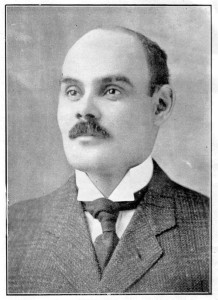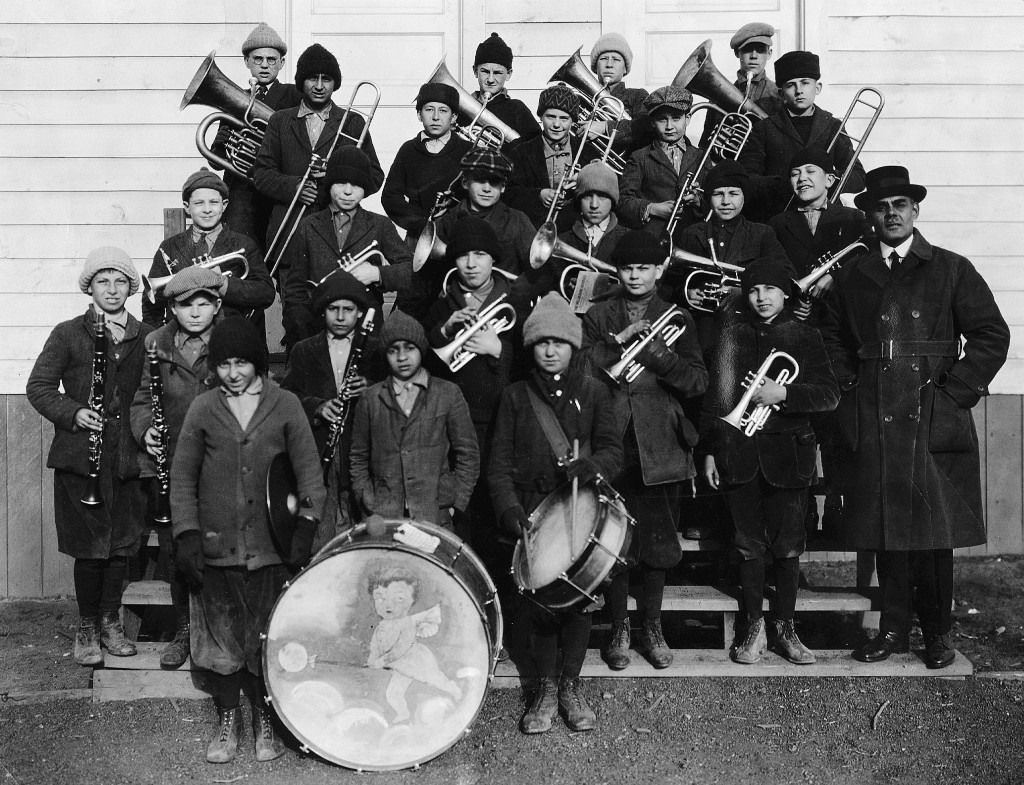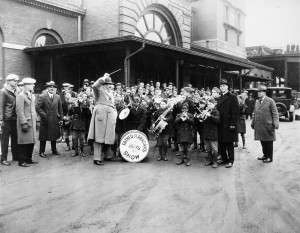Daniel F. Desdunes was born in New Orleans in 1870. He was born into a bygone New Orleans, into a society that recognized him and his family as members of a distinct cultural group, known as Creoles of color. His parents, Rodolphe-Lucien and Mathilde Cheval Desdunes were both descendants of refugees from Saint-Domingue.
Rodolphe-Lucien Desdunes was trained as a cigarmaker but spent most of his career in the Customs Service. He also had a successful literary career, which included numerous contributions to The Crusader (1889-98), a journal edited by Louis A. Martinet, an attorney and defender of civil rights. Rodolphe Desdunes’ major work was Notre Hommes et Notre Histoire (1911), a pioneering work of Creole history. In its pages, Desdunes recounted the well-known members of his community and their ongoing efforts to achieve equality and justice.
It was in 1891, that Rodolphe-Lucien Desdunes and seventeen other men of color organized the Comité des Citoyens, or Citizen’s Committee, which launched the historic Plessy v. Ferguson case, which after reaching the United States Supreme Court, was settled by the “separate but equal” ruling. Many people however, do not know of the committee’s earlier challenge of the law.
On an appointed day, 24 February 1892, Daniel Desdunes, bought a ticket for travel to Mobile, boarded the Louisville & Nashville Railroad, and took a seat in the “white” coach. All went according to plan. Desdunes was scheduled for trial by the Criminal District Court in New Orleans and released on bail. On 21 March 1892, local attorneys filed a plea protesting that Desdunes was not guilty and attacking the constitutionality of the Jim Crow laws, particularly Act 111 of the 1890 Louisiana Legislature (the “Separate Car Act”). Unlike the later Plessy case, Desdunes’ case never went to trial because the State Supreme Court ruled that the ‘Separate Car Act’ did not apply to interstate travel.
“Dan” Desdunes, as he was more commonly called, was famous for his musical abilities. He was a skilled musician, trained classically under the strict tutor of the old professors. Desdunes is enumerated in the census as a teacher of music. In the early 1890s, Dan formed an orchestra with fellow cornetist and trumpeter, Sylvester Coustaut, Jr. The Coustaut-Desdunes Orchestra employed many of the great musicians, many of whom such as trombonist George Filhe, had played with the famed Onward Brass Band. Throughout the 1890s, Dan Desdunes toured the country with Dockstader’s Minstrels as part of a show band which often played in conjunction with traveling circuses.
At age twenty-five, Daniel married Victoria Oliver in New Orleans in 1895. From this union was born one son, Clarence August Desdunes on 17 February 1896. Victoria Oliver died shortly thereafter and he remarried Madie Desdunes. Daniel’s son Clarence was also a musician, noted as a skilled violinist and instructor. Clarence made his residence in New Orleans, and amongst his colleagues and acquaintances were Jelly Roll Morton and Danny Barker.
The segregation which Desdunes had sought to combat in his early years grew more and more oppressive in the early years of the twentieth century. Dan Desdunes, his wife, and young son left New Orleans for Omaha, Nebraska in 1904. His son would attend and graduate from the Technical High School of Omaha and his wife would work as a hairdresser. That same year 1904, the Omaha Military Band, the state’s finest band was organized. In 1908, Dan took the leadership of the band and gave it his name, having to recruit members from show bands in the early days. In 1918, the Chamber of Commerce designated the Dan Desdunes Band as “Omaha’s Official Band.” Dan Desdunes led the band on all official occasions, including trade trips, state fairs, numerous county fairs, good will trips, as well as functions and events across the mid-West and the nation. The band once performed Brighten the Corner for Billy Sunday. During World War I, rain or shine, the Dan Desdunes Band led the parade of recruited men, their relatives, and spectators to the railroad station. The band remained under Desdunes’ leadership until the time of his death in 1929. In 1935, Mr. George Bryant acquired charge of the band. In July, 1954 some fifty years after its beginning, the Dan Desdunes Band celebrated its golden anniversary with a tour of sixty-one cities.
In 1917, soon after Father Edward Flanagan founded his Boy’s Home later called “Boys Town,” Dan Desdunes visited the home and asked to lead the boy’s band. For twelve years, Mr. Desdunes visited Boys Town several times a week to instruct the boys in music and lead them in performances. The number of boys grew as to such that three bands were necessary. Sometime around 1922, the idea was conceived to have the band go on benefit tour. Every summer the Boy’s Home Band toured the mid-West and the nation, as far as New York City. Their railroad trips were made possible through the Pullman Company. On two occasions they played for President Calvin Coolidge. On both occasions, in 1927 at the summer White House in Rapid City and in 1928 in Superior, Wisconsin, President Coolidge commended the band, and particularly Willie Harris, a fifteen year-old Negro drummer on his ability to make “flying drum sticks.” The boys even performed regularly for radio listeners. On Sunday afternoons, they performed on the station KOIL from the Hotel Fontenelle in Omaha as well as WOW – the local Woodmen of the World station. One interesting observation made from the old issues of the Home Journal is that Willie Harris, known for his “flying drum sticks” also played center for the “Cornhuskers,” one of the Boys Home’s two outstanding football teams.
Professional musicians who heard the band marveled at their ability. They were praised as the best of the juvenile bands in the country. In an article on the band in the April, 1929 edition of Father Flanagan’s Home Journal it states, “Of course the boys like to play Jazz numbers, as all youngsters like peppy music. But Mr. Desdunes is too good a musician to allow them to become over-developed along these lines. He insists on some classical selections and the boys frequently tackle the marches by Sousa and other leading American composers.”
Desdunes had the great joy of having his boys play for and under the great John Phillip Sousa in 1927 upon a visit with his band to Omaha. Paul Whiteman, a world-famous orchestra conductor led the boys in Sonny Boy and other selections. When Whiteman asked the boys to “jazz it up” they immediately swung more lively to the music. Mr. Whiteman was so impressed that he gave Mr. Desdunes ten dollars and instructed him to treat the boys. They loaded the Home’s bus for an uptown drug store where they enjoyed ice cream sodas. Some of the songs the boy performed were: Sonny Boy, Old Fashioned Girl, Hula Lou, Little Johnny Green, Juanita, Freckles, Old Irish Mother, Brown Jug, and Ode to Our Father. In 1928, Desdunes composed a spirit song for the Creighton University Bluejays entitled “Rah, Rah, Bluejay.” The Boy’s Home Band played the piece publicly for the first time at the Creighton-Utah football game on 10 November 1928.
Daniel F. Desdunes, native New Orleanian, activist, musician, instructor, bandmaster, and friend of homeless and wayward boys died on 24 April 1929 in Omaha at 59 years old. He had suffered a severe cold for two days. Despite being ill, he led the band for his last time on April 20, only four days before his death. In addition to a professional career of over thirty years in music, in his twelve years at Boys Town, he managed to transform a group of eager homeless boys into a group of fine young musicians recognized all over the nation. While his own band played at his funeral in St. Phillip’s Church, Father Flanagan and all the members of the Father Flanagan’s Boy’s Home Band were in attendance.
Part of the lasting legacy he left is a song entitled Dividends of Smile which he wrote in 1927, and dedicated to Father Flanagan’s Boy’s Home.
There are times when you are blue
Knowing not just what to do
Then try helping someone worthy
It will thrill you through and through
Get some bonds of joy and gladness
Yielding dividends of smiles
They will make you feel so happy
Save them in your goodwill files
When you’re feeling sad and feeling lonely
Take them out with fondest care
They will give you friendly greetings
You will find a treasure there
Get some there
Yielding Dividends of Smiles
Sources: Father Flanagan’s Boy’s Home Journal – 1922-1929, Father Flanagan Home Archives; Dan Desdunes – Vertical File, Hogan Jazz Archive, Tulane University; Federal Censuses, 1850, 1870, 1880, 1900, 1910, 1920, 1930; Daniel Desdunes (Photograph), taken from Notre Hommes et Notre Histoire, www.nutrias.org, (New Orleans Public Library).
Jari Honora





